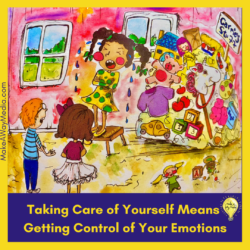 I had a talk this week with a friend who was very upset. I mean heated like hands shaking can’t think straight upset. Sometimes when people talk to me, I know I just need to listen, but sometimes I feel like I need to intervene, and this was one of those times.
I had a talk this week with a friend who was very upset. I mean heated like hands shaking can’t think straight upset. Sometimes when people talk to me, I know I just need to listen, but sometimes I feel like I need to intervene, and this was one of those times.
Taking care of yourself also means taking care of your emotions. I try real hard not to tell people how to feel, but every once in a while, that’s exactly what a real friend should do.
Here is what I want to share with you about this experience. Anger is a very dangerous emotion. If you think back on a time when you were really angry, and the things you did as a response to that anger, you might remember doing and saying things that you regret or wish you handled them differently.
If you feel angry, mad, or really teed off, this is the time to spend alone and get control of the source of this jet fuel. Rarely is anger the real emotion. Think about that. What is it that you are really angry about. You made be disappointed, feel disrespected, or be very hurt. To be clear, you have every right to be mad if you feel mad. But anger is a very dangerous emotion. It is like a wildfire, and it will burn everyone around you, including you down to bits leaving nothing bust ash and smoke.
Here are my tips for figuring out what is really going on when you feel angry.
- Spend time alone. People who love negativity and misery sometimes love to see people upset. This is not the crowd you want to find when you are angry. They will literally pour gasoline on your fire and encourage you to do something you will immediately regret.
- Talk to yourself– just like you would to a good friend. Or talk to God, or the universe, or a close relative who always gave you good advice and has passed away. Use this to help you get to the real source of your anger so you can figure out how to really handle the problem instead of just reacting to it.
- Remind yourself that all things pass. You can even repeat a mantra to yourself like, “This will pass” or “Things always get better”.
- Ground yourself with something that you can focus on that reminds you of goodness like your favorite candle that smells like the beach or cover yourself and rub a blanket that is soft.
- Write how you feel down so you can begin to learn from your experiences. Sometimes when things happen it can feel like these things are happening to us, when really, they just happened around us. Many times, we are hurt and upset and no one else is even aware of how this made you feel. Really work to get to the source of this pain. Anger is not the emotion- it is the reaction. What you may really be feeling is tired of ongoing disrespect or hurt by feeling left out or not having your feelings considered.
- Wait 24 hours (or more) to respond outwardly.
- Gain some perspective by doing anything else- go for a walk, care for your plants, read a book, bake some muffins.
If someone has hurt you, you have a right to be upset. You have right to let them know. Try to remember that when you come at people with anger, they will not be able to hear you and your message will be lost. Taking this time will help you truly process how you feel and refine your message so the problem can be resolved rather than magnified.
(The image above is taken from Think of It Like This. A book by Deedee Cummings that focuses on reframing negative situations as a way to handle emotions in a better way.)

